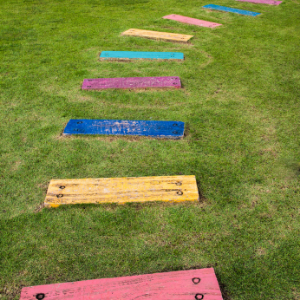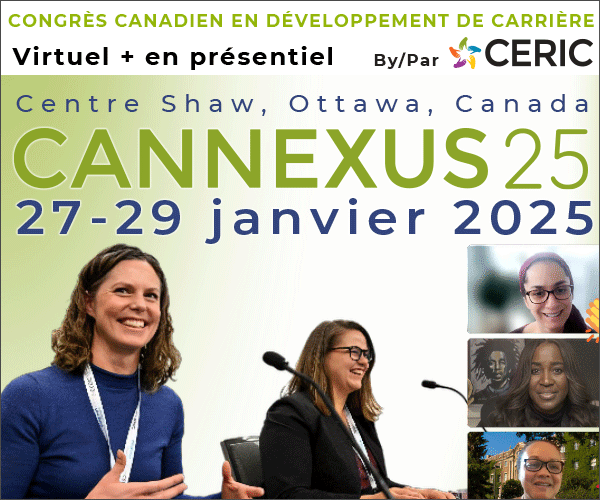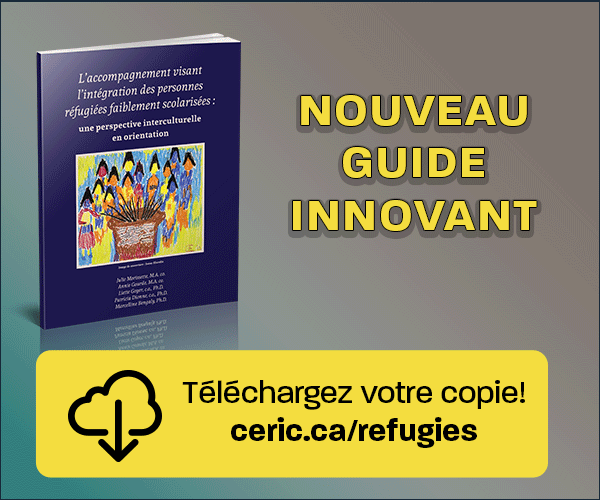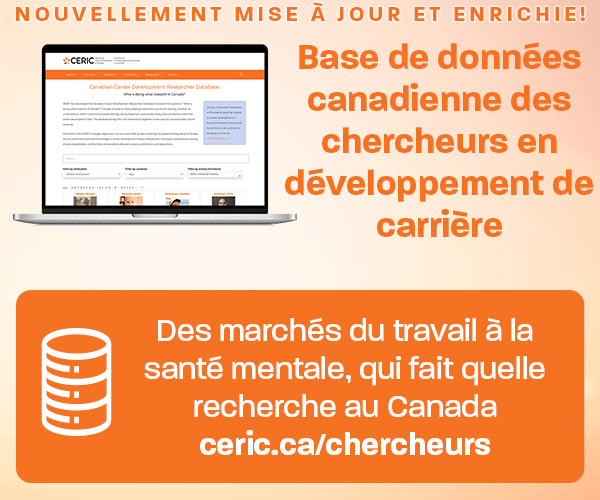Un modèle de cheminement des prédicteurs émotionnellement associés à l'indécision professionnelle des étudiants américains.
DOI :
https://doi.org/10.53379/cjcd.2022.329Mots-clés :
décision de carrière auto-efficacité, indécision de carrière, planification de carrière des étudiants, l'intelligence émotionnelle, bien-être socialRésumé
Cette étude à petite échelle établit un modèle de cheminement pour expliquer comment les variables à contenu émotionnel affectent l'indécision de carrière dans l'enseignement supérieur. Nous avons étudié un total de 240 étudiants de premier cycle et un modèle de cheminement des effets directs et indirects entourant l'indécision de carrière a été établi en utilisant la modélisation par équations structurelles (SEM). Notre modèle de cheminement montre un effet direct positif de la procrastination sur l'indécision de carrière (β = .13, p < .001), avec des effets directs négatifs sur l'IE, la satisfaction de vie, le CDSE et la planification, en termes de conflit de carrière. L'IE présente une corrélation positive avec le CDSE (β = 0,51, p < 0,001). Les résultats indiquent que les variables liées aux émotions sont de bons prédicteurs des préoccupations professionnelles des étudiants en psychologie.
Références
Blustein, D. L., Ali, S. R., & Flores, Lisa Y. (2019). Vocational psychology : Expanding the vision and enhancing the impact. The Counseling Psychologist, 47(2), 166-221. https://doi.org/10.1177%2F0011000019861213
Brackett, M. A., Rivers, S. E., Shiffman, S., Learner, N., & Salovey, P. (2006). Relating emotional abilities to social functioning: A comparison of self-report and performance measures of emotional intelligence. Journal of Personality and Social Psychology, 91, 780-795. https://doi.org/10.1037/0022-3514.91.4.780
Chung, Y. B. (2002). Career decision-making self-efficacy and career commitment: Gender and ethnic differences among college students. Journal of Career Development, 28, 277-284. https://psycnet.apa.org/oi/10.1023/A:1015146122546
Coetzee, M., & Harry, N. (2014). Emotional intelligence as a predictor of employees’ career adaptability. Journal of Vocational Behavior, 84, 90-97. https://doi.org/10.1016/j.jvb.2013.09.001
Falco, L. D., & Summer, J. J. (2019). Comparing ability and self-report trait emotional emotional intelligence, fluid intelligence, and personality traits in career decision. Personality and Individual Differences, 64, 174-178. https://doi.org/10.1016/j.paid.2014.02.024
Gati, I., Krausz, M., & Osipow, S. H. (1996). A taxonomy of difficulties in career decision making. Journal of Counseling Psychology, 43(4), 510-526. https://doi.apa.org/doiLanding?doi=10.1037%2F0022-0167.43.4.510
Gray, M. A., Kim, M., & Lee, S. (2021). Simplifying the measurement of college students’ career planning: the development of career student planning scale during the COVID-19 pandemic. Experimental Results, 2, e4, 1-9. https://doi.org/10.1017/exp.2020.69
Gray, M. A., Kim, M., & Lee, S. (2021). Career self-efficacy as a mediator between emotional intelligence and employment planning among US college students. Canadian Journal of Career Development, 20(2), 70-76.
Gray, M. A., Lee, S., & Kim, M. (2020). Comparing self-reported emotional intelligence, self-efficacy, and personality traits in college students’ career decision-making: A pilot study. In S. Lee (Ed.), Exploring the opportunities and challenges of college students (pp. 205-217). NOVA Science Publishers, Inc.
Hair, Jr., J.F., Black, W.C., Babin, B.J., & Anderson, R.E. (2019). Multivariate analysis (8th ed.). Cengage.
Işik, E. (2012). The relationship of career decision self-efficacy, trait anxiety, and affectivity among undergraduate students. Psychological Reports: Human Resources & Marketing, 111(3), 805-813. https://doi.org/10.2466/01.09.10.PR0.111.6.805-813
Jiang, Z. (2016). Emotional intelligence and career decision-making self-efficacy: Mediating roles of goal commitment and professional commitment. Journal of Employment Counseling, 53(1), 30-47. https://doi.org/10.1002/joec.12026
Law, K. S., Wang, C. S., & Song, L. J. (2004). The construct and criterion validity of emotional intelligence and its potential utilities for management studies. Journal of Applied Psychology, 89(3), 483-496. https://doi.org/10.1037/0021-9010.89.3.483
MacCann, C., Jiang, Y., Brown, L. E. R., Double, K. S., Bucich, M., & Minbashian A. (2020). Emotional intelligence predicts academic performance: A meta-analysis. Psychological Bulletin, 146(2), 150-186. http://doi.org/10.1037/bul0000219
Mavronvelli, S., & Sanchez-Ruiz, M. J. (2011). Trait emotional intelligence influences on academic achievement and school behavior. British Journal of Educational Psychology, 81(Pt1), 112-134. https://doi.org/10.1348/2044-8279.002009
Mojgan, F. N., Kadir, R. A., & Soheil, S. (2011). The relationship between state and trait anxiety with career indecision of undergraduate students. International Education Studies, 4(3), 31-35. https://doi.org/10.5539/ies.v4n3p31
Sanchez-Ruiz, M-J., & El Khoury, J. (2019). A model of academic, personality, and emotion- related predictors of university academic performance. Frontiers in Psychology, 10, e2345. https://doi.org/10.3389/fpsyg.2019.02435
Spurk, D., & Straub, C. (2020). Flexible employment relationships and careers in times of the COVID-19 pandemic. Journal of Vocational Behavior, 119, e103435. https://doi.org/10.1016/j.jvb.2020.103435
Tatum, H. E., & Schwartz, B. M. (2020). Chapter 7 Best practice – the capstone course in psychology: Addressing challenges and incorporating best practices. In A. Schwarz andR. L. Miller (eds), High impact educational practices: A review of best practices with illustrated examples (pp. 126-139). Society for the Teaching of Psychology.
Taylor, K. M., & Betz, N. E. (1983). Applications of self-efficacy theory to the understanding and treatment of career indecision. Journal of Vocational Behavior, 22(1), 63-81. https://doi.org/10.1016/0001-8791(83)90006-4
Wong, C. S., & Law, K. S. (2002). Wong and Law emotional intelligence scale (WLEIS). [Database record]. APA Psyc Tests. https://psycnet.apa.org/doi/10.1037/t07398-000

Téléchargements
Publié-e
Comment citer
Numéro
Rubrique
Licence
(c) Tous droits réservés La Revue canadienne de développement de carrière 2022

Cette œuvre est sous licence Creative Commons Attribution - Pas d'Utilisation Commerciale - Pas de Modification 4.0 International.











